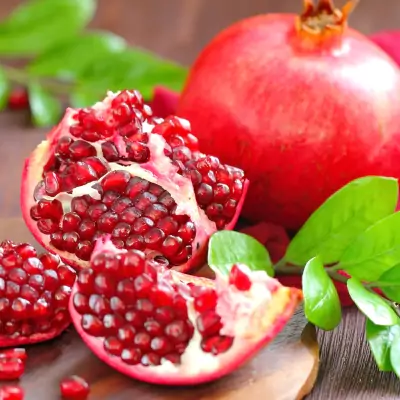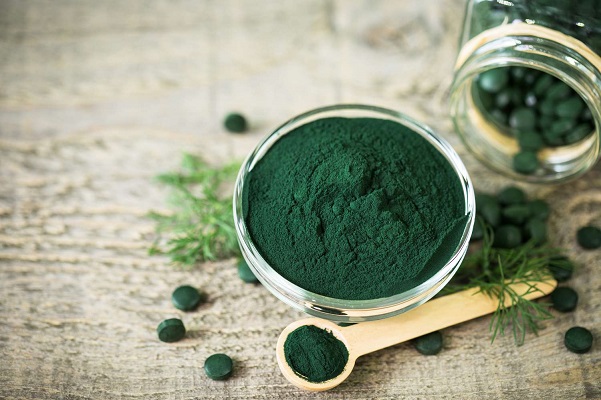On This Page
Overview
Pomegranate is known as Anaar in Hindi. The scientific name for pomegranate is Punica granatum. It is a common ingredient in salads, smoothies, baked goods, and juices and falls under the classification of flora known as deciduous shrubs.
Pomegranate fruits are renowned for their ability to aid in weight loss, provide anti-inflammatory properties, and fight prostate and breast cancer. They are a wonderful source of vitamin C, dietary fiber, folate, and potassium. In addition, they contain strong antioxidants like punicalagin and punicic acid that help the body get rid of harmful free radicals that would otherwise oxidize good cells. These small red arils, which resemble “pearls,” are undoubtedly packed with benefits for improving both physical and mental health.
Synonyms of Pomegranate
- Punica granatum
- Anaar
- Kamphoi
- Daanimma
- Daalima
Nutritional Facts of Pomegranate
| Energy: | 83 kcal |
| Carbohydrates: | 18.7 g |
| Sugars: | 13.67 g |
| Dietary fiber: | 4 g |
| Fat: | 1.17 g |
| Protein: | 1.67 g |
Phytochemical Constituents Of Pomegranate
- Ellagitannins
- Gallotannins and Their Derivatives
Therapeutic Uses of Pomegranate
- Pomegranate Aids with arthritis
Joint swelling is usual in people with arthritis. Pomegranates’ anti-inflammatory properties aid in relieving any inflammation. Pomegranates successfully block the enzymes that harm joints, according to studies on the topic. As a result, it can aid in the effective treatment of osteoarthritis.
- Improves hemoglobin
Iron content in pomegranate seeds is very high. Ironworks work wonders to increase hemoglobin levels. You will be anemic if your body doesn’t produce enough hemoglobin. You’ll feel weak, worn out, and often lightheaded if you have anemia.
- Combats bacterial and fungal infections
A study found that pomegranate can combat the yeast Candida albicans and several dangerous bacteria.
Pomegranates have the presence of very potent elements that combat harmful germs and bacteria. These qualities might guard against oral infections.
- Controls Blood Pressure
The delicious fruit pomegranate also does wonders for controlling your blood pressure. According to a study, pomegranate juice or eating the fruit can reduce blood pressure.
- Manages Diabetes
Pomegranate has several advantages for people with diabetes since, despite having a high carbohydrate content, the fruit doesn’t alter or raise your body’s general blood glucose levels. People with diabetes are frequently encouraged to consume the fresh juice of uncooked pomegranate seeds since it helps to prevent type 2 diabetes in addition to hydrating the body.
Home Remedies of Pomegranate
- Diarrhea
Boil 20 grams of pomegranate (Anar) and 3 grams of cinnamon in 250 ml of water to treat diarrhea. Drink 30 to 40 ml of liquid, once it has cooled, three times daily.
- Stomachache
Eat some fresh pomegranate (Anar) seeds with a little salt and pepper if you have a stomach ache.
- Skin Irritation
Crush the pomegranate (Anar) bark into a fine powder to treat skin irritation brought on by intestinal worms.
- Fever
Make a paste out of pomegranate seeds and internal fruit bark, and take it with regular water twice a day for fever and diarrhea.
- Jaundice
Pomegranate is helpful for jaundice because it heals the liver. Make a drink with pomegranate juice, lime juice, rock salt, and a bit of ginger powder, and it will assist with jaundice brought on by indigestion, anorexia, and weakness.
- Vitiligo
The leaves of the pomegranate are useful for treating vitiligo. A longer period of continuous use is very beneficial for vitiligo.Mix 7-8 grams (one and a half teaspoons) of pomegranate powder with a glass of water twice a day.

Have A Health Issue?
Consult Online
- Dr. Sahil Gupta (B.A.M.S., M.H.A.)
Ayurvedic Allergy Specialist
CEO & Founder of IAFA®
Ayurvedic Aspects of Pomegranate
The fruit pomegranate is full of nutrients and offers several health advantages. This fruit is well-liked in Ayurveda for its ability to detoxify the blood. For many years, people have used pomegranates as a source of vitamins and minerals. It is a very helpful product in Ayurveda because of its curative qualities. It is known as “Dadima” in Ayurveda and is used to cure a variety of illnesses. Pomegranates, according to Ayurveda, are full of beneficial qualities that can be used to treat doshas and heal the body. Pachan, which has digestive effects, Deepan, which is palatable, Kashaya, which is astringent, and Vajikarana, which has aphrodisiac properties.
Daily Dose: The recommended dosage for pomegranate extract is 750 mg
Side Effects of Pomegranate
- The Pomegranate enzyme may impact the liver
Pomegranate includes enzymes that could impair the liver’s ability to operate. Before consuming pomegranates, a person should talk to their health expert if they are currently taking any form of medicine for a liver condition.
- High calories
Pomegranate should be avoided by those trying to lose weight because it is high in calories and, if ingested in excess, can result in weight gain.
Conclusion
Pomegranate is a wonderful and delicious fruit. It has a tonne of health advantages and can treat the signs of some of the most severe illnesses, including cancer, diabetes, high blood pressure, and hypertension. The human body greatly benefits from the antioxidants, nutrients, vitamins, and minerals that are abundant in pomegranates. Pomegranates have a lot of benefits, but they also have some drawbacks. When ingested in excess, pomegranates can be harmful, and some people may be allergic to them. If you face a pomegranate allergy or any negative effect you can consult Dr. Gupta at IAFA he through herbal treatment manages all kinds of allergies and other negative effects.
References
- https://www.ncbi.nlm.nih.gov/pmc/articles/PMC6151597/#:~:text=Ellagitannins%2C%20Gallotannins%2C%20and%20Their%20Derivatives,is%20often%20a%20glucose%20molecule).
- https://en.wikipedia.org/wiki/Pomegranate#:~:text=The%20edible%20 portion%20of%20 raw,DV%20for%20folate%20.








